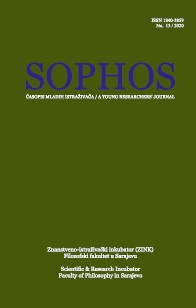TRANZICIJA I TRANSFORMACIJA PORODICE
TRANSITION AND FAMILY TRANSFORMATION
Author(s): Adnan FočoSubject(s): Gender Studies, Cultural history, Human Rights and Humanitarian Law, Social history, Family and social welfare, Globalization, Socio-Economic Research
Published by: Filozofski fakultet u Sarajevu - Znanstveno-istraživački inkubator
Keywords: transition; globalization; transformation; family; family and traditional values; family breakdown; family stereotypes; women's rights; children's rights; divorce; breakdown of traditional;
Summary/Abstract: Transition disintegrates old creations, not only economic, but also family, customary and traditional ones of different peoples and climates. Its influence on the very nature of the movement of capital, money, technology, but also labour force is indisputable. By changing the place of residence, the great work transition and migration (mostly work transition) have a great influence on the change of family relations, on tradition and on the adoption and acceptance of the new value system and rules of the country in which they live. This certainly contributes to greater rights and freedoms of family members, greater rights of women in relation to the domicile country or country of migration, greater opportunities in the educational process and an increase in personal rights and freedoms in relation to traditional and rights in countries from which the families have emigrated. Of course, economic and educational independence contribute to that process, but also the democracy of the developed countries. Precisely the clash between the old and the traditional, and in the encounter with the new, creates a great family conflict, and that is the abandonment of outdated or traditional family models and stereotypes. In the process of transition, family models are universalized and become common regardless of their origin and domicile stereotypes. This speaks best about the democratization, not only of the family and marriage, but also about the democratic system and the achieved rights of individuals. This is especially reflected in the forms of family life, marriage, its dissolution, the right to property, and the rights and position of children, social and individual care and obligations in the process of guardianship and socialization. These are all issues that require consideration from all aspects, not only from formally legal and social ones, but above all from the aspect of new social relations and necessary models in order to more fully realize individual and collective human rights and to leave family stereotypes in the past.
Journal: Sophos- časopis mladih istraživača
- Issue Year: 2020
- Issue No: 13
- Page Range: 53-64
- Page Count: 12
- Language: Bosnian

